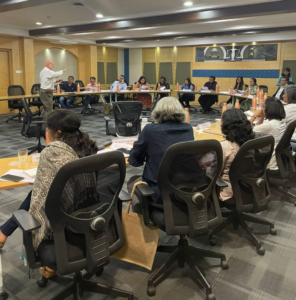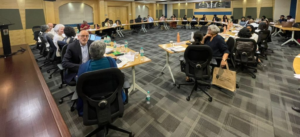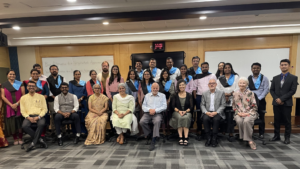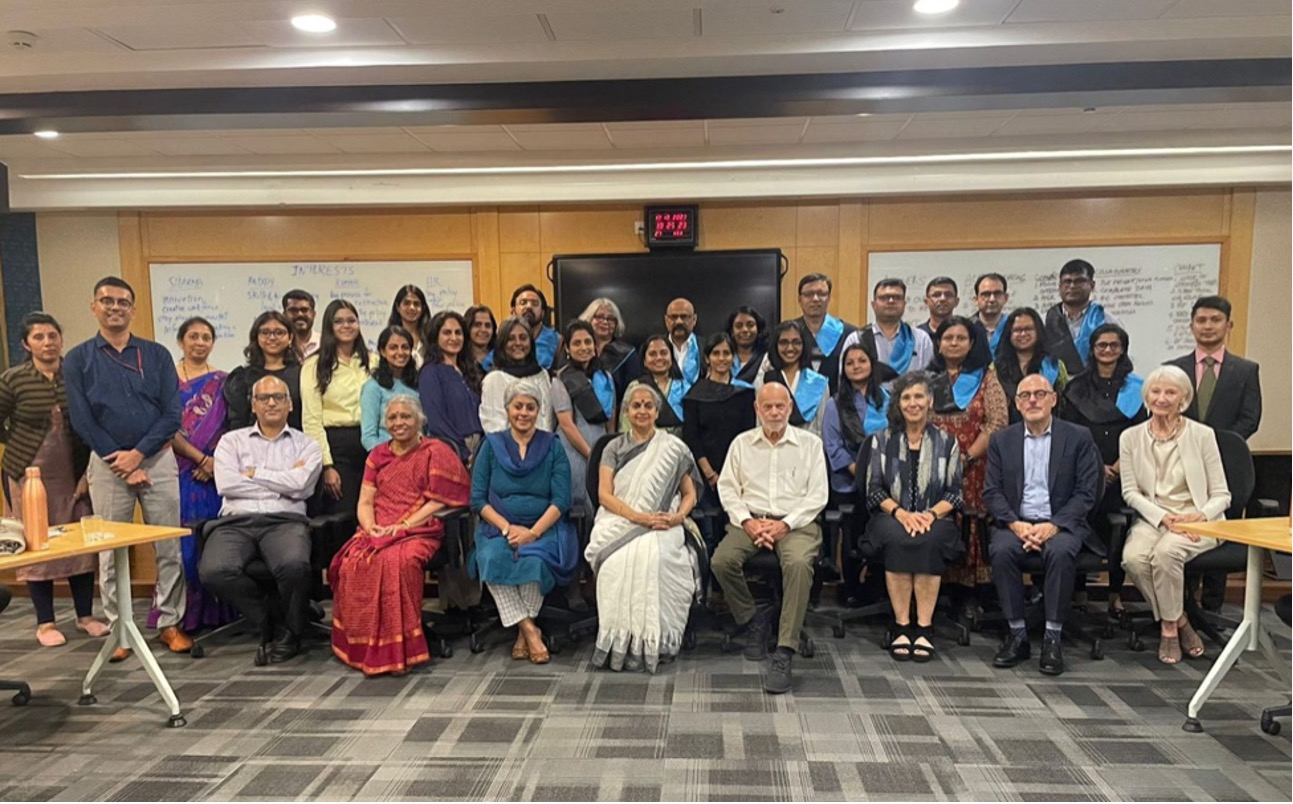To help working professionals gain practical knowledge and skills to effectively navigate conflicts in their professional lives, a workshop on “Conflict Competence and Collaborative Problem Solving” was conducted by NLSIU, Bengaluru on October 18, 2023. The event was organized in collaboration with the CAMP Arbitration & Mediation Practice Private Limited and Foundation for Sustainable Rule of Law Initiatives (FSRI), and featured a distinguished panel of speakers, including:
- Claudia Bernard, a trainer, mediator and consultant in the San Francisco, California Bay Area.
2. Dana Curtis, mediator for a broad range of disputes in her California Bay Area, California practice. She conducts mediation training for organization, courts and law schools including Stanford Law School and Harvard Law School.
3. Howard Herman, mediator in a private practice with JAMS in San Francisco where he specialized in matters involving high emotion and complex power dynamics.
4. Victor Schachter, Founder and President of the Foundation for Sustainable Rule of Law Initiatives.
5. Laila Ollapally, Founder of CAMP Arbitration and Mediation Practice, who has practiced as an advocate for over three decades in the Supreme Court of India and High Court of Karnataka. Session I – Introduction to conflict competence and understanding ourselves in conflict
Session I – Introduction to conflict competence and understanding ourselves in conflict
The session kicked off with a discussion on “Understanding Ourselves in Conflict” which was led by Claudia Bernard. The speakers introduced participants to the Thomas Kilmann Conflict Mode Instrument, a well-known tool for identifying one’s conflict style. The instrument revealed five main conflict styles: Avoiding, Accommodating, Compromising, Competitive, and Collaborative. Participants took the assessment, gaining insight into their own conflict styles. This exercise encouraged self-reflection and allowed participants to understand the challenges, advantages, and suggestions for working with people who had differing conflict styles.
Session II – Empathy and active Listening
Effective communication is a cornerstone of conflict resolution, and empathetic listening is a critical component of this skill. The session delved into empathetic listening by emphasizing three key elements: intention, care, and reflecting back. The lecture was followed by an interactive listening exercise, highlighting qualities of a good listener, such as being focused, patience, effective use of body language, and the ability to create a safe communication environment. Participants also engaged in an empathy exercise, illustrating the profound impact of empathy in conflict resolution. This competence underscored the essential role of empathetic listening in fostering productive communication and resolving conflicts.
Session III – Skillful questioning
Skillful questioning is a powerful tool in conflict resolution. The session introduced two types of questions that can be asked, cooperative and collaborative, and provided guidance on when to use each type. The discussion delved into the art of asking questions that encourage dialogue and cooperation rather than provoke defensiveness. This competence empowered participants with the knowledge of crafting and deploying questions strategically to facilitate open, solution-oriented conversations during conflicts.

Session IV – Effective assertion
Conflict resolution also requires individuals to assert their needs and concerns effectively. The session delved into the tools and techniques for effective assertion. Points emphasized included the importance of listening first, self-reflection, and using assertive communication rather than aggressive or passive styles. Participants gained insights into how to express their views assertively while maintaining respect for others’ perspectives. The skill of assertiveness was presented as a valuable asset in resolving conflicts.
Session V – Collaborative problem-solving process
The final competence was dedicated to the collaborative problem-solving process. It commenced with an illuminating role-play involving CAMP employees facilitating a mock mediation of a workplace dispute. The interactive exercise demonstrated the practical application of conflict resolution techniques discussed throughout the workshop. Following the role-play, a discussion led by the speakers emphasized the importance of preparation and structure in resolving conflicts collaboratively. This competence highlighted the significance of a systematic approach to conflict resolution, which promotes understanding and sustainable solutions.
Session V – Collaborative problem-solving process
The final competence was dedicated to the collaborative problem-solving process. It commenced with an illuminating role-play involving CAMP employees facilitating a mock mediation of a workplace dispute. The interactive exercise demonstrated the practical application of conflict resolution techniques discussed throughout the workshop. Following the role-play, a discussion led by the speakers emphasized the importance of preparation and structure in resolving conflicts collaboratively. This competence highlighted the significance of a systematic approach to conflict resolution, which promotes understanding and sustainable solutions.
Participants were from diverse backgrounds – from human resources and business professionals, to lawyers and academics. The participants also discussed about trust building, upskilling, learning and unlearning, better management and self-growth.
The session concluded with a speech by Prof. N S Nigam, Registrar, NLSIU, and distribution of certificates to the participants.
Partnering Organisations
CAMP Arbitration and Mediation Practice Private Limited is a pioneering institutional mediation service provider enabling businesses to move from conflict to collaboration. Founded by expert dispute resolution professionals, CAMP has mediated innumerable disputes with a success rate of 80%.
Foundation for Sustainable Rule of Law Initiatives (FSRI) is a non-profit NGO dedicated to creating and supporting viable and sustainable mediation and alternate dispute resolution programs in developing democracies around the globe.




